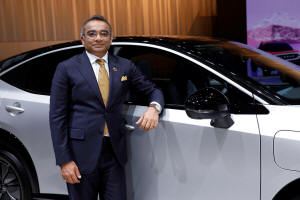|
The
comments from Ashwani Gupta also highlight how the yen is no
longer a straightforward issue for many Japanese manufacturers.
Unlike decades ago, when a weak yen was an unmitigated boon
because it made Japanese goods more competitive in foreign
markets and drove up revenues when they were brought home, more
firms today are manufacturing abroad.
Still, the pace of this year's yen decline - the currency is
hovering at its lowest against the dollar in 24 years - has
worried policymakers in Tokyo. On Wednesday, authorities issued
their clearest signal yet that they were not comfortable with
recent sharp declines and were preparing for intervention. [FRX/]
Currency moves were the last part in "the business value chain,"
when it comes to Nissan's planning, Gupta said in a Reuters
Newsmaker interview. "We don't take our decisions, especially
the mid- and long-term decisions based on the current foreign
exchange rate," he said.
Almost a quarter of Japanese manufacturers' production is
carried out overseas, according to the latest data from Japan's
trade ministry. That compares to around 17% a decade ago, and
less than 15% two decades ago.
For the auto industry, the proportion of overseas production is
even higher - 44%, the data showed.
Nissan has production operations in more than a dozen countries.
Countries are also asking it to produce more in their markets,
he said, adding such local production can be linked to
incentives offered by governments.
Gupta also said that the automaker would be able to weather
potential tighter regulations on clean cars in some countries
because of its twin strategy of producing its "e-power"-type
advanced hybrids and battery-electric vehicles.
"We are fully prepared," he said. "From the economy of scale
viewpoint, we use the same e-power train for e-power and the
battery electric."
Shares of Nissan are little changed so far this year, slightly
outperforming a 3.2% decline in the Nikkei 225 average.
(Reporting by Pete Sweeney; Editing by David Dolan, David Evans
and Kim Coghill)
[© 2022 Thomson Reuters. All rights
reserved.]
This material may not be published,
broadcast, rewritten or redistributed.
Thompson Reuters is solely responsible for this content.

|
|





